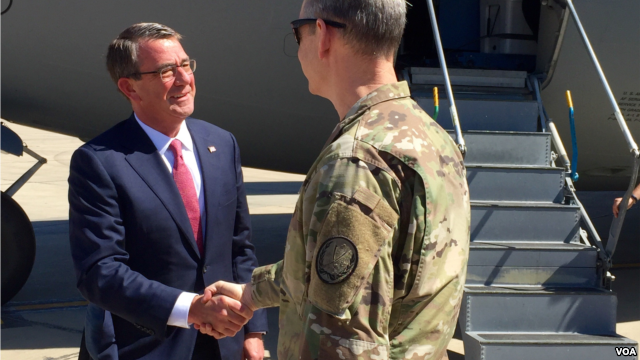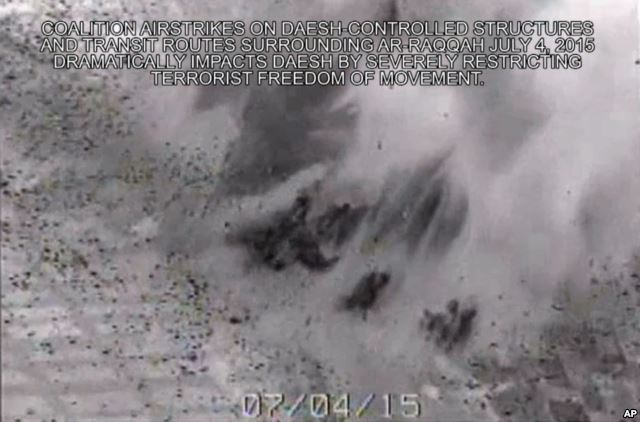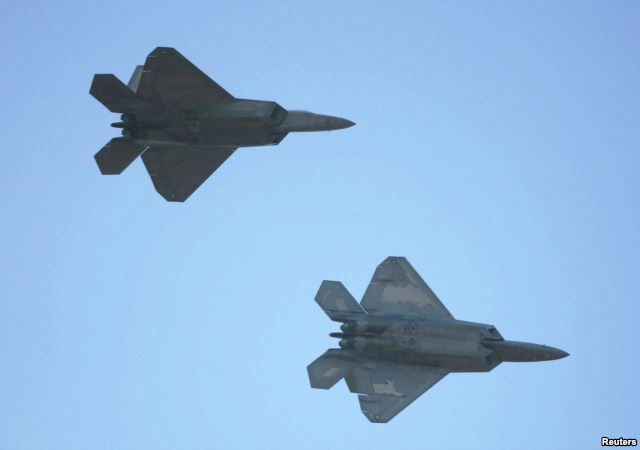US Defense Secretary in Iraq for Talks on Beefing Up IS Fight

U.S. Defense Secretary Ash Carter arrived in Iraq Monday to talk with his commanders and Iraqi leaders about ways the U.S. can ramp up the fight against Islamic State militants in Iraq and Syria.
“The Iraqis are not shy about asking for what they need,” a senior defense official said. “Our generals, our colonels, they are sitting next to the Iraqis.”
Speaking to reporters in the United Arab Emirates Saturday, Carter expressed confidence the White House will approve recommendations.
"We are looking to do more," Carter said at Al Dhafra Air Base near Abu Dhabi. "That ranges from in the air to on the ground. You should expect to see us doing more."
The U.S.-led coalition has used the air base for airstrikes against Islamic State, as well as for intelligence, reconnaissance and surveillance missions.
His visit to the region comes as the U.S. is considering an increase in the number of American troops in Iraq.
“I think whenever we are talking about additional capabilities, it usually means some small numbers of additional troops,” the senior official said. “But honestly what’s much more important is the capability and what it’s going to do for us in the fight.”
“Our presence on the ground will continue to be to enable, not to substitute for local forces,” Carter told reporters.
Air power
According to some at the Al Dhafra Air Base, the U.S. has already upped its munition power from the air and expects to continue to increase air power over the next six months.
“The F-22 has seen quite an expanded role since we’ve been here,” an F-22 fighter jet operations officer told Carter during his visit to the base Saturday. “The last six months the unit that we just swapped out with, they dropped just over 200 munitions, precision munitions out in the theater. Just this past week, we’ve dropped 20 percent of that, so 40 munitions in just a week.”
In addition to munitions, about a third of the aircraft deployed to this base is dedicated to surveillance over Iraq, Syria and Afghanistan.
Carter said the troops at Al Dhafra Air Base played an important role in the fight against Islamic State.
“These people are pretty busy and some of them are in risky situations every single day,” Carter said.
Mosul
During his visit to Iraq Monday, Carter is also looking for an update on the fight to retake Mosul, Iraq’s second largest city.
“Everyone knows the fight of Iraq is the fight for Mosul,” a senior defense official said. “Mosul is the end game in Iraq.”
Iraqi forces began an offensive to retake the Islamic State stronghold on March 24th.
Michael Rubin, a scholar at the American Enterprise Institute, told VOA the U.S. strategy seemed to be “containing” Islamic State, which continues to lose ground in Iraq and Syria, but worries that needed improvements to the strategy could come “too little, too late.”
“When it comes to the fight against the Islamic State, it's almost as if we diagnosed with cancer at Stage One and then sat about arguing about whether or not we should prescribe an aspirin for the next four-five years while it metastasized to Stage Four,” Rubin said.
Carter’s visit Monday is his third to Iraq as secretary of defense.
Политика конфиденциальности | Правила пользования сайтом









